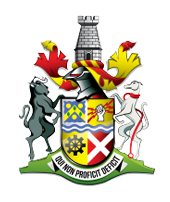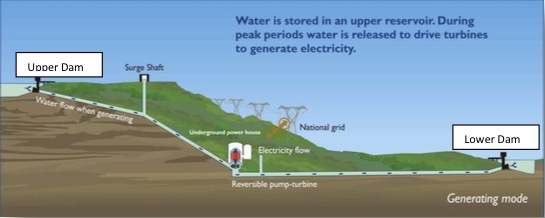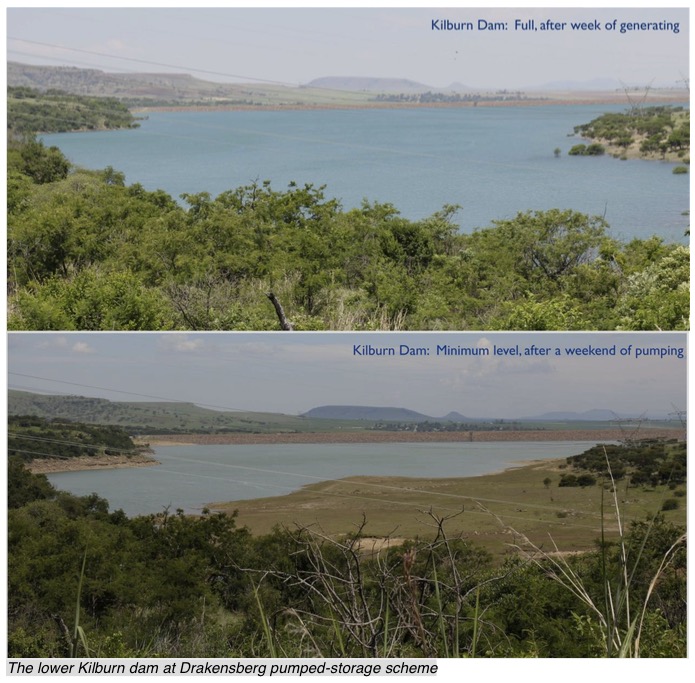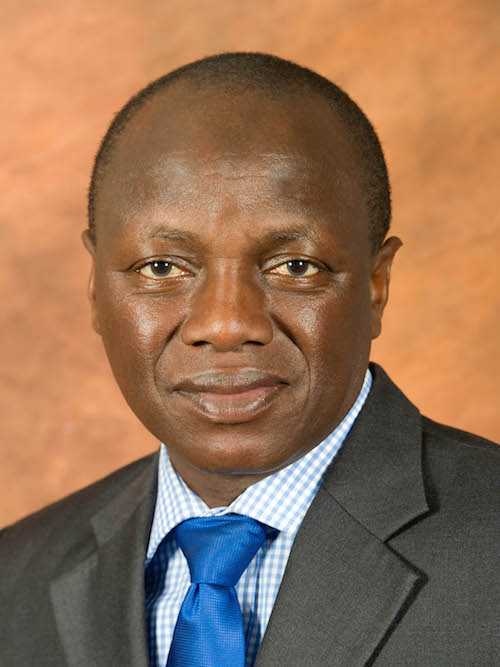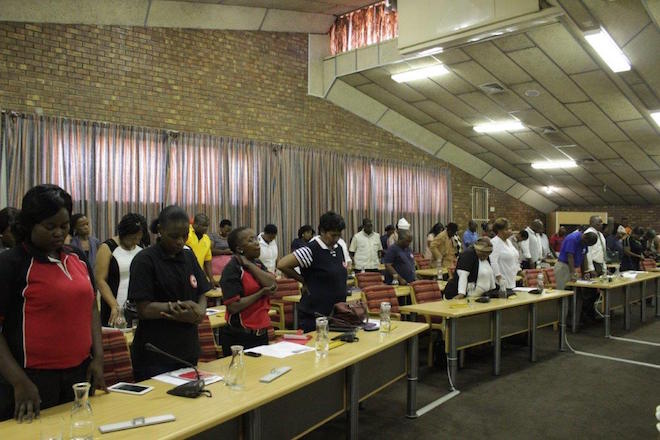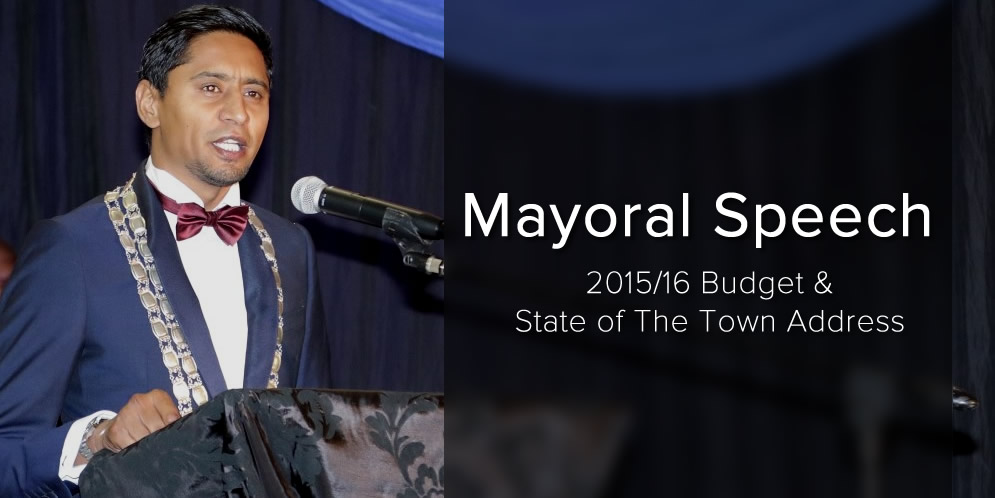
Mayoral speech : 2015/16 budget & State of The Town Address
Honourable Speaker, Cllr M F Zikhali,
Deputy Mayor of Newcastle Municipality, Cllr Racheal Mdluli,
Her Worship, the Mayor of Amajuba Municipality, Cllr Jabu Khumalo
Members of the Executive Committee of Newcastle and Councillors present
The Chairperson of the ANC Emalahleni Region, Dr Ntuthuko Mahlaba
Other officials, members of the REC and other political parties
The Acting Municipal Manager, Mr Errol Mswane and all Municipal officials present.
Abafundisi present
Members of the media,
Ladies and gentleman and to those listening at home through NCR.
I wish you a good evening, Sanibonani!!
It once again gives me a great pleasure and honour to present the draft operating and capital budget for 2015/2016 financial year and to speak a little about the state of the town…. The year 2015 marks 60 years of a historic moment in our history, when South Africans from all walks of life adopted the Freedom Charter in 1955, in Kliptown, Soweto. They declared amongst other things, that South Africa belongs to all who live in it, black and white, and that no government can justly claim authority unless it is based on the will of all the people. That was a powerful, visionary and reconciliatory statement which set the tone for the non-racial democracy we have established.
Last month we also marked 25 years since the release of former President Nelson Mandela from prison, and since the unbanning of liberation movements. The release of Madiba marked a giant leap in the long walk to freedom for the people of South Africa as a whole and dealt a fatal blow to apartheid colonialism. We continue to be inspired by Madiba and draw lessons from his legacy as we build our own city.
President Jacob Zuma in his state of the nation address in February 2015, elaborates more about the freedom charter and I quote “The year 2015 is the Year of the Freedom Charter and Unity in Action to Advance Economic Freedom.”
It is the year of going the extra mile in building a united, democratic, non-racial, non-sexist and prosperous South Africa. It is also the year of rededicating ourselves to eradicate racism and all related intolerances in our country. It is also the year of investing more in our future, by educating our children and the youth about the rich heritage of this country.”
The city of Newcastle has always taken its directives from the president of the republic in general and national government in particular. We therefore echo his word when he asks us to rededicate ourselves, reinvest and more importantly to go the extra mile building a united, democratic, non-racial, non-sexist and prosperous South Africa.
Honourable Speaker, the budget for 2015/16 was crafted under extremely difficult conditions. First and foremost the plight of our people remains uppermost in our minds. We were tasked with finding an almost impossible balance of changing the lives of our communities, more especially in the townships like Madadeni and Osizweni, rural areas like Mndozo, Blaauwbosch and Charlestown in which communities did not receive basic services, as compared to making certain we don’t over burden the paying consumers of the suburbs.
We understand full well, the difficult financial times our communities are having to endure.
I can assure you, your cries during winter months of exorbitant electricity bills does not fall on deaf ears. Whilst we may not have had a lot to say at that time, simply because there are no conspiracy theories and the user pay principal is a bitter pill to swallow, we have been hard at work, going back to the drawing board to ensure that we continue to live up to the lofty aspirations of being a government that listens and cares. The budget was also written during an era of perceived political and administrative instability in the town.
The resignation of our SED Technical Services Mr Sandile Dube who took up a prestigious position at the DBSA, the lapsing of the contract of our legal services Director, Mr Makosini Nkosi, the ending tonight of the contract of Mr Eugene Hauptfleusch, SED Corporate Services, the vacancy in the position of SED: Budget and Treasury, and finally the resignation of our Municipal Manager, Mr Kebone Masange to a senior position as HOD Human Settlement in Mpumalanga Province has created a vacuum in my administration.
Whilst this is a challenge that we have to endure, it is certainly a challenge that we are able to overcome. Within the next few months we will have these posts filled, with suitably qualified candidates who must be equal to the task of taking the city forward.
The Council itself became fragmented and we seemed to lose touch of our purpose which is to serve our community at large. I always hold a belief that not only should we be united as political parties to uplift the communities that we serve but because we also have a duty to do so as we live in these very communities.
Somlomo, because of this, I want to theme the 2015/16 budget: UNITED, WE WILL MOVE NEWCASTLE FORWARD!!!
Somlomo, taking the above into account we have still managed to take great fiscal care of our Municipality and managed to place before you a well-balanced, financially viable budget.
Our total operating revenue goes up to R1 590, 892, 402 and our capital budget stands just under R393 million. As you will see Honorable Speaker, we continue to drive our very intensive program of infrastructure development. Once again reassuring the community that we will never rest, that townships like Madadeni, Osizweni, Blaauwbosch and surrounding areas will one day look the same as the suburbs of Aviary Hill, Hutten Heights and paradise.
ROAD AND STORM WATER
We continue to budget for more roads with R87.1 million being spent for brand new roads in this town. The bulk of this money will go to new roads in Madadeni to the tune of R27.5 million and R16 million to Osizweni. R27 million will see the final phase of Allen Street extension from the Kirkland street intersection to the intersection at Victoria road.
R6 million will see the first phase of a new road entering Charlestown for the first time in the history of this town. R3.6 million will see the construction of a tar road in Watt Street in the industrial area for industrialists who have started trading there already. R1m will go the Hathorn Street extension that leads to the weir. This should go a long way in accelerating development to that beautiful facility.
R6m will also see the second part of the highway that leads from Marconi Drive to the Clifford Manana Bridge on Asiphephe Road and R700 000.00 will see the Sesiyabonga road extension.
R1.6m will start the rehabilitation of Jenkyn Street.
Honourable Speaker, over and above this and throughout the budget address, you will see us heed the calls by our President, Honourable Jacob Zuma, his Minister for Corporate Governance and Traditional Affairs, Mr Praveen Gordon for Municipalities to go back to basics. In this regards we have budgeted R14 million extra to reseal existing roads in our suburbs as well as in our townships.
Somlomo, at this juncture, I would like to introduce to you, a few special guests that I invited from ward 31, Soul City. These guests raised issues around the lack of a pedestrian bridge leading to their homes. What touched me, was that their children had to walk through feaces every day to get to school and back. When it rained, the children would play in pools of water containing faeces. I could never imagine my own children going through that, and it brought tears to my eyes. I invited them here tonight, firstly to apologise to them that government has taken so long to touch their lives, but also to give them the good news that we have now budgeted for a bridge to be built there.
Two bridges, one in ward 31 and one in ward 6, will be built during 2015/16 financial year.
We will also continue with our sidewalk paving projects, making it easy for communities to live healthier lifestyles by running and cycling on the sidewalks and also to neaten and beautify our townships and suburbs. A further R1 million has been budgeted in this regard.
R600 000 has again been placed on the budget for traffic calming devices (speed humps) throughout the city.
Waste water treatment work in Madadeni will see an upgrade of R11m, Viljoen Park bulk water pump station for R8.5 million and Ingagane water treatment plant, the source of all our water will see a further extension to the tune of R9.4 million to keep up with the demands of a growing city.
Lennoxton, Hutten heights and other areas have experienced many water outages because of old infrastructure. R3 million has been placed on this budget to start a pipe replacement project. The Osizweni E and F sewer connections will continue with R4.5 million and Stafford Hill will receive
R7 million .
In Osizweni we have budgeted R14.8 million to do as we have done in Madadeni, kick starting a project of refurbishing our networks, going into people’s homes and replacing old systems and leaking taps. This should go a long way in reducing our water losses and saving the municipality millions of rands.
ELECTRICITY
We continue as we have done in the past to upgrade and maintain our electrical network throughout our licensed area. Maintenance on a daily basis is run from the operational budget but I will just highlight some our major capital purchases for the coming year. R33.6 million has been put aside in this regard. We will be studying the efficiency of our own municipal buildings and making certain that we reduce our own footprint.
R4.5 million has been placed on the budget to change our street lights into LEDs as already seen in some parts of our town like portions of Allen Street and Montague Street. this will reduce our own electrical consumption. We also have a further R1 million to do the same at our pump stations.
Our mechanical workshop will receive an upgrade for R1 million although we believe that a feasibility study should be done to determine whether this workshop is still viable for the needs of our fast improving fleet.
The technological advances in these new vehicles makes it difficult for the municipality to keep up. We have started an amazing project at Ingagane where we have taken over the street light project as a pilot project from Eskom and we are currently installing brand new street lights.
i believe that the people of Ingagane will appreciate that they will never have to walk in the dark again. We have budgeted R5 million more for high mast lighting in high crime infested areas and R2 million to start taking our street lights away from Eskom in Madadeni and Osizweni.
PARKS, FIRE AND WASTE
We continue to spend R8 million on state of the art community hall in the JBC area and R3.7 million to complete the new hall in Charlestown. R500 000 has been budget for new furniture in the halls because we believe they should be open early next year.
Our Fort Amiel Museum will see ablution facilities to the value of R620 000. We have placed R4 million for the establishment of 2 new play parks in Madadeni and Osizweni which I must add is a huge success with youth forming into groups to train on our outdoor gym equipment.
3 play parks in the west will be upgraded to the tune of R2 million with all the new equipment. These will include, Fernwood, Patterson street and Aviary Hill.
My intervention, together with the Executive Committee into the now infamous Patterson Street Park has reaped some results with bright lighting and a threat of immanent CCTV camera coverage has seen a reduction of disorderly behavior I am now pleased to announce Honourable Speaker, that this budget has a further R180 000 to fence that park.
Our sports facilities around the city will see some upgrading with R1.8 million going to fence the Arbor Park sports ground, R500 000 to upgrade Paradise sports grounds, R1 million for netball courts at Osizweni, R2 million to upgrade Mzamo sports field and R270 000 to upgrade the Newcastle swimming pool.
R1.5 million will see Fernwood receiving the first mini cricket facility in the city.
Somlomo I believe that we are still not doing as much as we could be doing in terms of promoting sport development in Newcastle. This needs to be addressed urgently by the department of Community Services, and they seriously need a more active liaison between themselves and sports associations. Sports facilities that are under our care like the bowling club, must be given adequate resources to maintain the high standards we have developed over the years.
The Newcastle golf club, who are leasing the facilities from the Municipality, are struggling financially to maintain the course. This is one of the most beautiful golf courses in KZN and people travel long distances to play here. In this regard, I ask Council to consider a 100% electricity rebate for them, thus freeing up their funds to maintain the course. This should be done with the explicit understanding that the course will also be used free of charge for associations who want to develop young and upcoming sportsmen from disadvantaged backgrounds.
Our extension of Roypoint cemetery will see a new caretakers house and ablution facilities in the new section. R500 000 will go towards new grass cutting equipment as we continue to extend grass cutting into the townships.
After the last few years of actively purchasing fire trucks, we believe that our fire department is now better equipped to fight fires in Newcastle, Osizweni, Madadeni and surrounding areas. Although we have budgeted R500 000 to boost them with a 4 x 4 to fight veld fires.
A further R600 000 to place litter bins in Newcastle, Madadeni and Osizweni, however I must state at this point that I am not totally satisfied with the frequency that these bins are being emptied, understanding that the department is struggling with human resources. This is a classic case of the Municipality thinking outside the box and coming up with innovative ideas to resolve the problem.
A partnership between the municipality and the home owner closest to the bin could be a start. R2 million will be a purchase of bulk refuse containers and a specialized vehicle of collecting dirt around a skip container will be purchased. Two more brand new refuse trucks will be purchased eradicating the need of the yellow tractors in Madadeni and Osizweni. Our principal of “one city, one service” will continue.
The landfill site where our refuse is deposited is a ticking time bomb. We have already started the process of identifying another sight and are currently busy with environmental issues. In light of the fact that the new sight maybe be further away from the city, a material recovery facility at a cost of R2 million will be established. The fencing at our protection services department is in a state of a disrepair, and is it houses very expensive assets as well as our security section, we have to spend some money to fence it. R1,8 million will be spent in this regard.
Security at the Municipality will be tightened, including at all our off site operational and taxi ranks. The Newcastle taxi rank, as well as our new ranks in Madadeni and Osizweni will all be fitted with state of the art boom gate and vehicle registration recognition software to ensure safety of commuters using this facilities. The CCTV camera roll out will continue throughout the city, in suburbs, CBDs and townships alike, in a concerted and determined effort to fight crime. The recent spate of burglaries in some of our suburbs has been concerning, and we are working closely with the South African Police Services to help fight this scourge. We will also be fencing the Fairleigh library, after the Lennoxton library which will be done in this financial year. The Newcastle central library will see a major upgrade to the tune of R3,1 million ensuring that it remains our flagship library in the city.
LAND AND HOUSING
Somlomo, we are indeed proud of the giant leaps we have made regarding housing projects in and around Newcastle. It was a daunting task, taking on the province in making sure that our projects are approved and implemented, and today we are able to the enjoy the fruits of that labour.
The Kwamathukuza housing project has been rebuilt and people are now living comfortably in that area. I no longer receive calls from the community there every time it storms, because houses were literally falling on their heads.
The Osizweni section E projects, with a total number of 1240 Houses, with 352 already built, the Khathide housing project with 2000 Houses, 638 already built, and the Emawozeni project which gives 142 New houses to people with disabilities, with 137 already built, are all well underway and the quality of these houses are far superior to any house ever built by this municipality before.
Honourable Speaker, this is what we like to call, service delivery which u can touch and feel!
The Siyahlala housing project, which will turn the area into a fully serviced suburb, including tar roads, water, sewer and electricity is still in the provision of bulk services stage. R10 million has been further placed on this budget to complete the bulk services. The same goes for the housing project at H39 Madadeni. We are currently busy with the bulk sewer system in the area and are moving ahead with identifying the beneficiaries in that project.
The Blaauwbosch housing project, which is regarded as catalytic mega project, is one of those projects that will forever change the landscape of the area. R6 million will go towards bulk water services in this area. The complete plan for this project will see just under 10 000 houses built over 3 phases.
Honourable Speaker, we will be making a great dent in our housing waiting lists, and we have almost eliminated squatter camps in Newcastle.
Over and above these projects the municipality is actively pursuing the commercial, residential units for middle income residents. These will be upmarket rental apartments made available to the community.
The Suryaville and Fairleigh flats have also been given the go ahead to have repairs done to them and this project should start within the next few months. The Madadeni roof repair project which is now in phase three has a further 650 houses approved of which 164 have been completed already.
Somlomo, we continue to make more land available to our residents with R4.5 million going to service sites in Aviary Hill and Lenville in Fairleigh. The new sites will be made available once completed and allow our residents to build their own homes.
RURAL DEVELOPMENT
This ANC led government’s stance on rural development is a well-known fact. We have taken rural development to the next level, uplifting people and changing their lives. The new community halls in the JBC and Charlestown areas, play parks, housing projects, water and sewer infrastructure and tar roads are all proof that we put our money where our mouth is.
We have electrified the deepest rural areas of Mndozo , Amajuba Forest, Normandien and continue to electrify to the tune of R8 million. We have literally brought light to these people’s lives.
We continue with over R8 million of new toilets in wards 1, 6, 7, 12, 13, 15, 16, 30 and 31.
Somlomo, only those who visit these areas will understand the joy and dignity that we bring to these families with these services.
YOUTH, JOB CREATION AND POVERTY ALLEVIATION
Whilst local government does not have a mandate to budget for education, we cannot sit back and watch our youth struggle to get a decent tertiary education. Over the years, the office of the Mayor has assisted children with registration fees and the beginning of this year has seen that over 480 children being registered through our office. We also place our warmest acknowledges to David Faulkner from Newcastle upon Tyne in the UK, who has funded 5 students with registration fees through the Newcastles of the Worlds Alliance.
Over and above the registration fees, my office has 18 children receiving full bursaries for studies in finance and engineering, with contracts signed so that these children will return once qualified to work in our municipality.
This has a 3 fold benefit, firstly the child is able to study, secondly the skills shortage in these areas are resoled for the municipality and thirdly these children are able to return to Newcastle with a job awaiting them. Our spending on capital projects should generate a further 2 000 temporary jobs. We continue the dictum that every project should only higher labourers from that particular ward.
Honourable Speaker, in keeping with the African National Congress mandate in the region, the office of the Mayor will investigate the formation of youth and women development units that will be better equipped to assist us in making decisions affecting these sectors. Poverty alleviation projects are once again budgeted to the tune of just over R2.5 million. These projects are given to groups of people who will create the most jobs, and have the best plan in sustaining their ventures.
NEWCASTLE OFFICE BLOCK
Honourable Speaker, this has been one of the most painful experiences in the history of my career although I still firmly believe that generations to come will thank us for the bold steps we have taken to bring this project to completion.
I am glad to announce that the entire project only requires R89 million to complete of which R74m will be placed in the 2015/16 budget and R15 million next year. The office block will be completed by September this year and will see us occupying these offices by the end of this year.
Honourable Speaker, I have tried to summarise the operating and capital budget for the 2015/16 financial year. All the projects that I have mentioned and others have a profound effect on the lives of the people of Newcastle.
This makes us proud. What also makes us proud Somlomo, is that the budget is fully funded and that the municipality will not take any internal loans for this financial year. However, an increase in rates by 10% to offset the reduction in the valuation of properties last year as well as the rates reduction, was unavoidable. Water, sewer and refuse will all be increased by 7%. Electricity, which has been increased by Eskom by 14% will be increased by 12, 2 % unfortunately. these rates are governed by NERSA. To assist with the plight of our residents and to heed the calls from our communities we are now making prepaid meters available as of July 1st. These pre-paid meters will cost the municipality R2 200.00 each to purchase and install and we will only be asking the consumer to pay a once off fee of R1 300.00 to have them installed. R3 million has been placed on the budget to subsidies these meters. We trust that this will go a long way in assisting communities to monitor and manage their own electricity usage.
The municipality has also been resisting Eskom by going on wide spread load shedding, but this may not last forever. Council has taken a decision that 40% of our electricity must be sourced from alternative energy sources such as biofuels and solar.
In this regard, I will be leading a delegation to the USA next week to investigate a town that runs its entire electricity consumption on gasification programs out of their landfills sites.
Honourable Speaker, at this time, let me take the opportunity to thank and acknowledge the team from finance, led by the Acting CFO at the time, Mrs Asha Harripersadh, and the Director, Jerome Cele. They have been very prepared for us this time around, and there was very little shouting and screaming!! , the Executive Committee, which comprises of all the major political parties, for their hard work and dedication in working till late at night, with the extended MANCO, to make sure this deadline was met. I firmly believe that we have a great management team and that the municipality is in safe hands.
The Acting Municipal Manager during the budget process was Mr Eugene Hauptfleisch. Tonight is a truly sad time for me, as we see the retirement of my Hauptfleisch as our SED Corporate Services. Eugene, your hard work, dedication, and ability to get the job done on time will be sorely missed. Most of all, I will miss our light hearted banter in our Executive meetings. Today, we lose a real legend! Thank you for your service to the people of Newcastle.
The staff in my office deserve a recognition for always being up to the task of keeping me juggling through all my events, and getting this budget done. We pay tribute to Halima Mpofu, from my office, who passed away following a short illness, during our budget process.
I cannot end without thanking my family. My wife, Farhana, my sons and daughter, for all the times I have to be an absent father whilst honouring my official duties, I thank you and apologise from the bottom of my heart. My eldest son, Mohammed Zia, who is here with us today, wanted to understand exactly what I do, so I invited him along!!
Honourable Speaker, a special thanks goes to you and the Deputy Mayor, for making yourselves available throughout this process, and for standing in for me, when I have clashes with my schedule.
With those words, Somlomo, I hereby present the 2015/16 draft operating and capital budgets for Newcastle Municipality.
Ngiyabonga!!
Baai dankie!!
